'How I regret not asking my modest dad about his war heroics while I still could': It's a sentiment that'll strike a chord with many - and it drove CHRIS TARRANT to spend months uncovering his father's awesome bravery for a remarkable book
-
•Basil Tarrant was awarded Military Cross for his bravery during D-Day
-
•He never spoke of his traumatic ordeal, once offered to do a documentary
-
•To his regret TV star son Chris rejected the idea, spent years tracking info
Published: 23:55, 16 May 2014 | Updated: 04:04, 17 May 2014
My dad was my closest friend. For nearly 60 years we laughed together, talked together and played sport together. I loved him and admired him in equal measure. But when he died I realised I hardly knew him at all.
Like so many men of his generation my father, Basil Tarrant, had fought in World War II and then spent the rest of his life saying nothing about it. That was what they did in those days. You locked your memories away and got on with your life.
God only knows what horrors Dad must have seen and suffered as a young infantryman. He came back battered but unscathed from the evacuation of Dunkirk in 1940, then went back into France on D-Day in 1944, fighting the retreating Germans through Holland, Belgium and into the Rhineland.
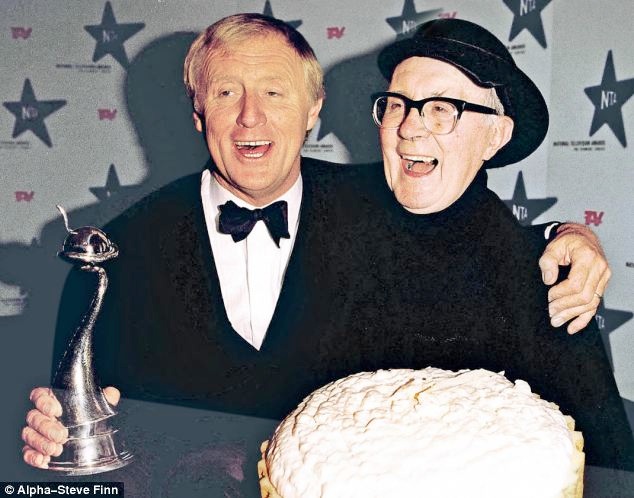
Regret: For the first and only time in 50 years my dad had at last decided it would be therapeutic to talk to me about what happened to him, and I turned him down. What an idiot I was
In 1945, his arm was shattered when a Jeep in which he was a passenger drove over an anti-tank mine. He was awarded the Military Cross for his exceptional bravery in northern France and recommended for a second, which, in the chaos of the end of the war, he outrageously never received.
But he told us, his family, virtually nothing. When he died in 2005, his wartime secrets went with him.
And for this I am, to my eternal regret, partly to blame. The previous year, in the spring of 2004, I made a mistake that will haunt me for the rest of my days.
I had recently started my own TV company and made a few successful documentaries.
‘You know, Chris,’ said my dad one day, ‘I’ve got an idea for your new company. You and I could go to Juno Beach and talk about D-Day, then the film could go out on June 6, the 60th anniversary. What do you think?’
Stupidly, I said No. There was only a month to go before the anniversary, which didn’t give us time to make and edit the documentary, let alone get it accepted and scheduled. It was one of the worst decisions I’ve ever made.
What sort of a mindless idiot was I? I should have seized Dad’s offer with both hands, even if the programme had never seen the light of day. For the first and only time in 50 years my dad had at last decided it would be therapeutic to talk to me about what happened to him, and I turned him down.
Even now, in the small hours of the morning my thoughtlessness comes back to haunt me. How could I have rejected my own heroic father because I couldn’t see beyond stupid TV scheduling? I will regret it bitterly for ever.
And that’s why, a decade on, I decided to uncover the story of those years — Dad’s War — for myself. It’s been a real labour of love, but it’s taught me so much about the man I thought I knew better than almost anybody. I’m ashamed of how little I actually knew.
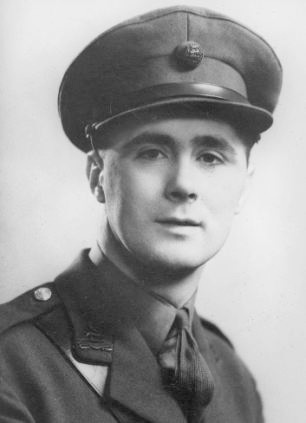
Lt Basil Tarrant the young wartime hero was awarded the Military Cross for bravery after D-Day
To me, my dad was always a hero. But the person I have only recently got to know is a true hero in every sense of the word — an honourable, courageous and inspirational man I feel proud to have called my father.
Five years after Dad’s death I took part in a television documentary called Hero In The Family, which set out to help people discover what their relatives had done during the war.
Only then, for the first time, did I start to piece together just what hell my father must have gone through all those decades ago. Every morning as we got up to start filming it was for me an extraordinary voyage of discovery.
The final film was beautifully put together and is a real tribute to my dad. But it made me hungry for more. There were still so many huge gaps in my knowledge of what had happened to him that I wanted and needed to fill in.
For the next few years I was a man on a mission. I visited the archives of my dad’s regiment in Salisbury, where they were wonderfully helpful as I ploughed through mountains of official paperwork. I have read every single wartime note, order and payslip that they possess.
I spent hours at the National Archives at Kew in South-West London, and waded through even more mountains of paperwork and computer disks at the Imperial War Museum. In addition, I’ve read countless war books, including biographies, autobiographies and regimental histories.
But above all, I needed to speak to people who’d been there, in France — people who’d served with Dad, who’d been through the same things that he had. I’d known so many as a kid growing up, but now they were nearly all gone.
In nearly two years of research I’ve found just five — but what amazing people they are. To have sat and talked to these exceptional soldiers, men who landed with my dad in Normandy on June 6, 1944, has been one of the greatest privileges of my life.
Without their help I could never have pieced together Dad’s story — an extraordinary story about an extraordinary man, written by one of the people who mistakenly thought they knew him best.
As war clouds loomed over Europe, young men like my father were encouraged to volunteer for part-time military service. At the age of just 17, and eagerly anticipating good times ahead, Basil joined the Territorial Army.
‘I loved being in the Terriers,’ Dad wrote later. ‘I don’t think I learned much about the Army, but we had a terrific time . . . so much fun.’
He stayed with the TA until August 25, 1939, when he was called up as a full-time soldier based with the 48th Division in his home town of Reading. Four months later he and his comrades were dispatched to France to join the British Expeditionary Force, building defences and preparing for fighting.
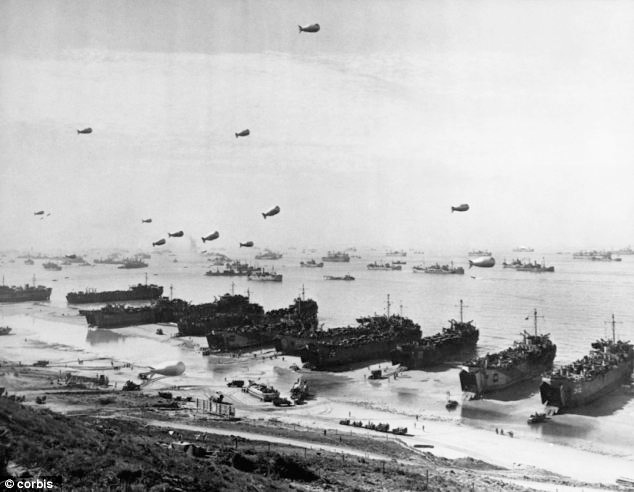
I have now spent years uncovering his experience and found letters describing the end of D-Day
For months nothing happened. When spring came round Dad and his friends were having such a good time in northern France that when a few days’ leave was offered in April, Dad was almost reluctant to take it. All the gloomy talk of war had begun to feel like a lot of a fuss about nothing.
Forty-eight hours after Dad’s return to France, all hell broke loose. On May 10, Hitler’s highly trained and mobile troops stormed into Luxembourg, Belgium and the Netherlands as a prelude to the invasion of France. The sheer speed of their troops and tanks caught the world napping.
Within a matter of days, the ill-prepared and unsuspecting French army was in retreat, leaving the British horribly exposed and isolated.
My father’s regiment, on the French-Belgian border, was suddenly facing the full force of the German onslaught. Dad had sauntered back from what he described as ‘a jolly nice spot of leave’ with his parents in Berkshire straight into hell.
The Allied forces had been entirely outmanoeuvred. A massive U-turn was ordered, and Dad’s division was told to prepare for the evacuation of Europe as best they could.
To me, my dad was always a hero. But the person I have only recently got to know is a true hero in every sense of the word
It is infuriatingly typical of my father that one of the only comments he ever made about the evacuation of Dunkirk, in a brief anniversary interview with a local reporter, was this: ‘We went over to France with the 48th but then on May 31 we retired rather hurriedly and made our way, any way we could, back to England via Dunkirk. It was all a bit of a shambles.’
Talk about understatement — so like Dad. A shambles? It was an utter Armageddon. They were still only young men — my father was just 20 — but the last two weeks of May 1940 changed his life and that of his mates for ever. For the first time in their brief military careers, they were forced to kill or be killed.
Some of Basil’s closest friends, boys he had grown up with, were slaughtered in front of his eyes. One young lad from Reading died with a single shot to the head, just falling where he stood, still pointing his rifle. Another died screaming in agony, his guts in his hands.
All around them desperate soldiers disobeyed orders and fought among themselves for a place on a boat — any boat.
British civilians who came to help with the evacuation were greeted, as they approached the Dunkirk coast, by the terrifying sight of wild-eyed men running through the water towards them screaming to get on board. Thousands from the Allied forces were drowned. My father and the survivors of his division were among the last British troops to leave French soil.
Under constant and relentless German attack their position, on the edge of Dunkirk, was, according to the division’s war diary, ‘precarious in the extreme.’
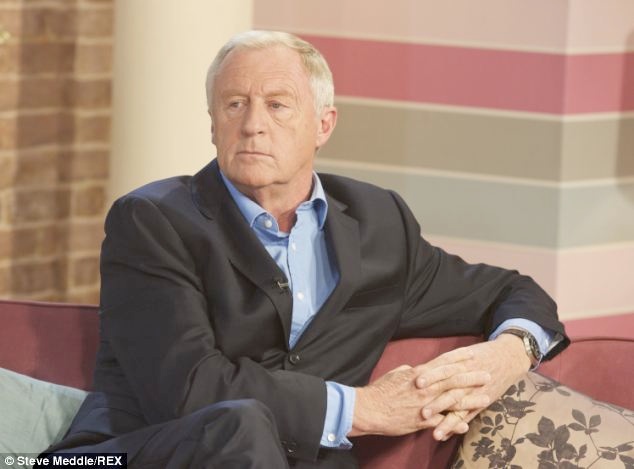
Inspired: To me, my dad was always a hero. But the man I have now got to know is a hero is so many more ways
Dad’s men were probably saved only by a turn in the weather, when a huge onslaught by Panzer tanks on the very part of the old town they were defending was foiled by soggy, waterlogged terrain. Basil had had a lucky escape — the first of many.
Sadly I have very little knowledge of Dad’s actual crossing back to Britain. Was he picked up by a Navy warship or one of the smaller vessels? How did he feel once he had got aboard a ship and turned his back on the hell that was France?
What scenes awaited him as he arrived in England? As Dad chose never to speak to me about it, he took these memories with him to the grave.
But what he witnessed during those few horrific days must have stayed with him for life.
A lot of young men, including him, grew up very quickly after Dunkirk. Many others in the same action would never have a chance to grow up at all.
Between June 1940 and March 1943, with invasion a strong possibility, Basil was stationed with the 48th division in Devon and Cornwall. But despite the horrors he had seen and the realisation of how lucky he had been to escape with his life from his first taste of action, just a few months after Dunkirk he was itching to get back to the fighting again.
In 1943, he applied to join the officer cadet training unit at Sandhurst and in July of that year passed out with flying colours.
Some of Basil’s closest friends, boys he had grown up with, were slaughtered in front of his eyes
A few weeks later he had joined his local regiment, the 5th Royal Berkshire, where he was put in charge of the 12th platoon, B company.
‘I’d been told in officer training that you never forget your first platoon, and that was so true,’ he wrote many years later. ‘I will never, ever forget any of them. They were a weird and wonderful bunch of blokes, always taking the mickey out of each other and almost certainly me behind my back — funny, stroppy but so brave and so loyal. Great men . . . great soldiers . . . wonderful.’
Nicknamed the Hackney Gurkhas because so many of them were from the East End of London, these blokes were perfect for Dad. They took no prisoners, but with his sharp wit and impressive fitness, he thrived on it.
One of the surviving Hackney Gurkhas I interviewed, Corporal Robert Purver, remembered Dad’s arrival at the regiment clearly, even after nearly 70 years. ‘He had a way about him,’ he told me. ‘He was very much in charge but he could relate to the blokes in a very easy way.
‘I didn’t like most of the officers but I liked Tarrant at once. He’d never tell rude jokes or anything like that, but he seemed to like us, because we were funny and so was he.’
Another former comrade of Basil’s, Private Doug Botting, felt the same.
‘Lieutenant Tarrant seemed genuine and really understanding,’ he said. ‘He actually seemed to care about what the blokes were thinking and feeling.
‘He played with us at sports, which very few of the officers ever did, and he played it really hard, but he took the knocks, tackles and fouls as well, just like the rest of the lads. He was very much the officer and we were very much the soldiers when we were on duty, but off duty he was one of the blokes.’
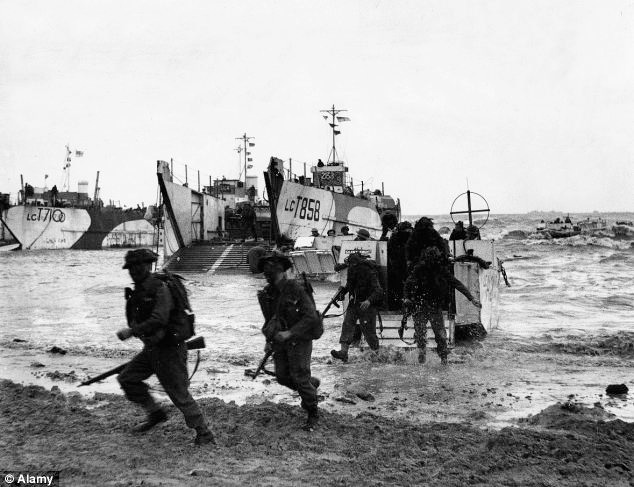
Dad recalled, 'We had to get under the firing line of that pillbox and run, moving from side to side, for perhaps 100 yards to get under the stream of bullets.'
Within weeks of Dad’s arrival, at the beginning of 1944, he and the rest of the 5th Royal Berkshires were busy on manoeuvres in Troon, off the west coast of Scotland, in preparation for a colossal invasion of Europe.
Although details were deliberately kept from the common soldier, it was clear from the sort of exercises that Basil and his men were doing — jumping in and out of little boats and running up cold wet beaches laden with battle gear — that a sea landing was going to be involved.
It was a tough time, but they all knew that when it came to the day, whenever and wherever that would be, it was going to be much, much tougher.
Dad and his men were moved from Scotland back to the south coast in May, and on June 3, silently and apprehensively, they were marched on to an enormous P&O luxury liner moored at Southampton. The day had come.
In his diaries, Dad remembered that there was no panic, but that some of the more extrovert men had gone very quiet. Many of the lads played cards for money, which was strictly against the rules, but a ‘who cares, given where we’re going?’ attitude was already prevailing, according to Dad’s friends. Others wrote what for many were final letters home — they had all been encouraged to draw up their wills before they left.
The so-called Hackney Gurkhas took no prisoners, but with his sharp wit and impressive fitness, my dad thrived on it
What none of them realised was that they were just one tiny part of an enormous fleet being assembled all along the south coast. For 48 hours, the men waited and then, after dark on June 5, the great ship’s engines powered up again and they moved out into the open sea.
It was then that Dad and the other officers were told that at first light they were going to land in Normandy. They were shown detailed models of the beaches where they were due to land, featuring all the landmarks, German-held pillboxes, wire defences, minefields, stations, churches and towers where snipers might operate from.
‘They were brilliant,’ wrote Dad later. ‘Every detail was spot on.’ His diary record of crawling up on deck on the morning of D-Day is, for him extraordinarily vivid: ‘The sight I saw I will never forget to my dying day. It was truly awesome in the fullest meaning of the word.
‘I have never, ever seen so many ships, nor ever, ever will again. We were several miles off a coast that I assumed must be Normandy and the sea was covered with grey ships of all shapes and sizes. Our British fleet was the closest, maybe six miles off, and the massive American fleet was several miles further out, getting ready to pound the German defences.
‘Years later I learned the exact details of what I saw. Apparently we were off Juno Beach, northern France, and there were 9 battleships, 23 cruisers, 104 destroyers, 71 corvettes and eventually 4,000 landing craft.
‘As they began to lower the landing craft, the sea looked really choppy. There was a big swell running which would make spotting mines very difficult and a beach landing even tougher. We were all given sea-sickness pills and most of the men were throwing up, but surprisingly I wasn’t sick at all, nor even frightened I don’t think, just apprehensive.
‘The German defences had no idea what was about to hit them. British radio operators on the Norfolk coast intercepting German signals that morning suddenly heard a wave of messages coming through, no longer even bothering to use Morse code: ‘Tommy kommt!’ (‘Tommy is coming!’) They were very frightened, clearly in a state of panic.
Dad remembered: ‘You could actually hear the trajectory of the shells in preparation for the beach assault. You felt you could touch them going over your heads. Suddenly things were very, very real. I do remember turning to my sergeant with a nervous grin and rather flippantly saying, “I don’t think I’m going to enjoy this . . .” ’

'The German defences had no idea what was about to hit them. They were clearly in a state of panic'
At this point they were still about five or six miles off the French coast and remained cruising for a long while because the sea was so rough.
Eventually the tide was high enough and — with great difficulty in the windy conditions — my father got into one flat-bottomed landing craft while his sergeant got into another, so if a boat got blown up the platoon would not be leaderless.
Each boat carried 36 men of all ranks, including several Canadians. A large Canadian contingent had already gone ahead, their brief to take the beach and move fast, not stopping for the wounded or prisoners, and go on to Caen, nine miles inland.
The Royal Berkshires’ orders were to follow up behind, secure the beach and eliminate all German resistance. As the overhead pounding by the navy continued, Basil and his B Company had to wait for two long hours until they eventually received the order to land.
It was a huge challenge: there were mines everywhere bouncing up and down in the swell, many of them linked, so if one went up the whole lot would.
One source of grim amusement to the Hackney boys, however, was the fact that the Germans had put signs up all along the beach saying ‘Achtung Minen’, basically telling them where the mines were.
As they approached the coastline they were greeted by the chilling and sickening sight of countless Canadian corpses being tossed on to the beach by the waves — the water black with blood — and yet more lifeless bodies littering the beach.
I wasn’t nervous, not really nervous at all, just exhilarated by everything that had happened since daybreak, but also very apprehensive
- from Basil's letters after D-Day
‘I kept bumping into bodies as I waded in towards the shore,’ said Doug Botting. ‘The French Canadians had been hit badly taking the first brunt of it, poor sods, and as you came on to the beach there were bullets whizzing all around us. The noise was horrific and there was a lot of screaming.’
Some of the Royal Berks’ landing party were hit by bullets before they were even able to get out of the boats.
As an officer, Dad was one of the first of the Berkshires ashore. Waving his Sten gun from side to side, he dashed up the beach. The leading troops were met by the crossfire of machine guns hidden in the sand dunes just at the top of the beach, the shelling of mortars and more distant artillery.
As men fell, others stepped up and they kept on running and weaving towards the beachhead. Those who survived, including my father, regrouped at the top of the beach under the sea wall beneath the line of German machine-gun fire, some 100 yards from the sea.
‘This was the first time we dared stop running,’ Dad wrote, ‘the first chance we got to check what the hell we’d come racing into. There were already many casualties, but the Germans had been badly hit too, and thank God their heavy fire was clearly getting less and less.’
Together they forced their way forward through the entanglement of barbed wire and anti-tank ditches, aiming for the beachhead on the outskirts of the coastal village of Bernières-sur-Mer, the nearest town to Juno Beach.
They had to pass many other casualties but the drill had been hammered into them for months: ‘Never, ever stop or look back. Never, ever stand still. If you stop you’re a target and targets get shot.’
As my father and B Company continued to make their way inland, with Allied troops still pouring in from the ships behind them, they came upon a pillbox which was resisting with machine-gun fire, raking the men arriving up the beach.
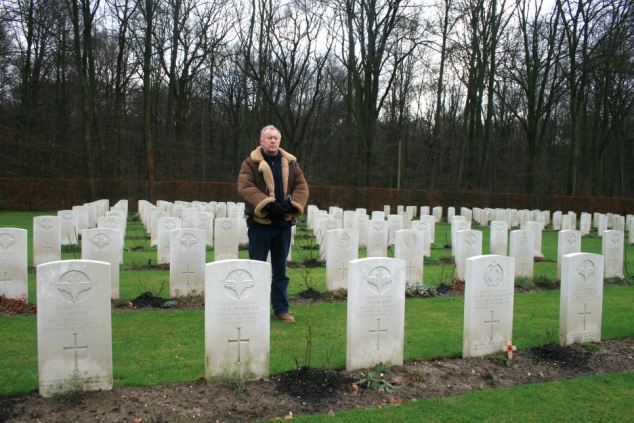
I know that he was very subdued when I asked him how it had gone, and just went quietly out into the garden. I didn't follow. The subject was closed
‘I started firing my Bren gun from close range into the slits in the pillbox,’ says Robbie Purver. ‘Suddenly the firing stopped. They were all dead. I think I killed a few but the first one will have been the first person I ever killed.
‘You just got immune to dead bodies. You were an infantryman and you knew your life expectancy was just a matter of weeks, so if and when you got yours you wanted a quick bullet in the head.
‘You wanted one you knew nothing about, you didn’t want all your guts hanging out; you just wanted it quick and not even see it coming. Of course you hoped to get through it but the odds for infantrymen were hugely stacked against you.’
Basil, too, was busy dealing with the reality of having death and danger all around him. As they climbed up and over more defences there was still German machine-gun fire raking across the sands, seemingly coming from yet another pillbox at the top.
Dad recalled, ‘We had to get under the firing line of that pillbox and run, moving from side to side, for perhaps 100 yards to get under the stream of bullets.’
Under fire, it probably felt more like a mile. A tank put paid to the pillbox with what was actually a lucky hit. Its shell didn’t hit the pillbox — its range was way too short — but instead it hit the sandbank in the front of it at its base.
This meant the whole pillbox actually fell forward, leaving the gun buried and useless.
‘After that,’ Dad said, ‘it all went horribly quiet, much too quiet.’ They had done it. They had overcome the enemy and they were back on French soil.
‘I wasn’t nervous, not really nervous at all, just exhilarated by everything that had happened since daybreak, but also very apprehensive.’
The Hackney Gurkhas who survived that first onslaught came of age on D-Day, and so did Lieutenant Tarrant. For the first time as a brand-new officer he had had the chance to prove himself to his men, and to himself.
Years later, on the 50th anniversary of D-Day, Dad and a few of his friends returned to Juno beach. Perhaps it exorcised some of the demons, perhaps it didn’t.
I know that he was very subdued when I asked him how it had gone, and just went quietly out into the garden. I didn’t follow. The subject was closed.
-
•Extracted from Dad’s War by Chris Tarrant, published by Ebury on Thursday, at £16.99. To order a copy for £14.99 (P&P free) call 0844 472 4157